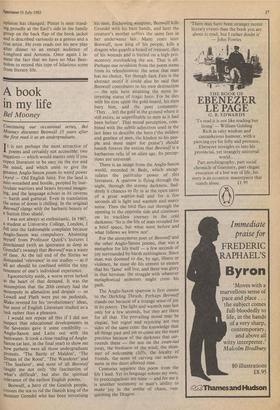A book in my life
Bel Mooney
Continuing our occasional series, Bel Mooney discusses Beowulf 15 years after She first read it as an undergraduate.
It is not perhaps the most attractive of poems and certainly not accessible: two negatives — which would matter only if you
expect literature to be easy on the eye and the mind, and which unite to give the greatest Anglo-Saxon poem its weird power (wYrd — Old English fate). For the land is mist-wreathed and hostile, peopled by inar- ticulate warriors and beasts beyond imagin- ing, and the language echoes in its caverns — harsh and guttural. Even in translation the sense of doom is chilling. In the original Beowu/f clangs with the barbaric beauty of a Sutton Hoo shield.
I was not always so enthusiastic. In 1967, a student at University College, London, I fell into the fashionable complaint because Anglo-Saxon was compulsory. Absenting myself from Professor Quirk's lectures I Proclaimed (with an ignorance as deep as
Grendel's swamp) that Beowulf was a waste of time. At the tail end of the Sixties we
demanded 'relevance' in our studies — as if all art should be confined within the tiny tenement of one's individual experience.
Egocentricity aside, a worse error lurked at the heart of that demand. It was the assumption that the 20th century had the Monopoly in alienation and despair — so Lowell and Plath were put on pedestals, Blake revered for his 'revolutionary' ideas, but most of English Literature studied as' a task rather than a pleasure.
I would not repeat all this if I did not _suspect that educational developments in the Seventies gave it some credibility — Anglo-Saxon and Latin out with the bathwater. It took a close reading of Anglo- Saxon (at last, in the final year) to show me how pathetic were all those undergraduate Protests. 'The Battle of Maldon', 'The
Dream of the Rood', 'The Wanderer' and `The Seafarer', and most of all Beowulf taught me not only 'the fascination of What's difficult', but also the spiritual relevance of the earliest English poems.
Beowulf, a hero of the Geatish people, crosses the sea to rid the Danish king of the monster Grendel who has been terrorising
his men. Eschewing weapons, Beowulf kills Grendel with his bare hands, and later the creature's mother suffers the same fate in her underwater lair. Many years later Beowulf, now king of his people, kills a dragon who guards a hoard of treasure, dies of his wounds and is buried on a high pro- montory overlooking the sea. That is all. Perhaps our revulsion from the poem stems from its relentlessness: the sense that man has no choice. Yet though dark Fate is the abstract motif it could also be said that Beowulf contributes to his own destruction — the epic hero attaining the more in- teresting status of tragic hero. For he dies with his eyes upon the gold-hoard, his men bury him, and the poet comments: 'They. ... left the gold in the ground where it still exists, as unprofitable to men as it had been before'. That moral perception, com- bined with the subtle adjectives used in the last lines to describe the hero (`the mildest and gentlest of men, the kindest to his peo- ple and most eager for praise') should banish forever the notion that Beowulf is a barbarous relic Of an alien age. Its percep- tions are universal.
There is an image from the Anglo-Saxon world, recorded in Bede, which encap- sulates the particular power of this literature. A sparrow is flying through the night, through the stormy darkness. Sud- denly it chances to fly in at the open eaves of a great warrior-hall and for a few seconds all is light and warmth and merry noise. Then the bird flies out through the opening in the opposite side and continues on its trackless journey in the cold darkness: 'So is the life of man revealed for a brief space, but what went before and what follows we know not'.
For the anonymous poet of Beowulf and the other Anglo-Saxon poems, that was a metaphor for life itself — a few seconds of joy surrounded by harsh nothingness. Since man was doomed to die, by age, illness or violence, he must do his utmost to ensure that his 'fame' will live, and there was glory in that heroism: the struggle with whatever metaphorical monsters might cross his path.
The Anglo-Saxon sparrow is first cousin to the Darkling Thrush. Perhaps Beowulf stands out because of a strange sense of joy in its poetry. The light and warmth may last only for a few seconds, but they are there
for all that. The prevailing mood may be elegiac, but regret and rejoicing are two
sides of the same coin: the knowledge that all things past and yet to come are the more precious because of the darkness that sur- rounds them — the sun on the swan-rad (sea), the freshness of the wind, the shim- mer of welcoming cliffs, the loyalty of friends, the sense of carving out achieve- ment in the short allotted time.
Centuries separate this poem from the life I lead. Yet its language echoes my own;
its preoccupations are mine — and for me it is another testimony to man's ability to make joy in the seethe of chaos, van- quishing the Dragon.






































 Previous page
Previous page